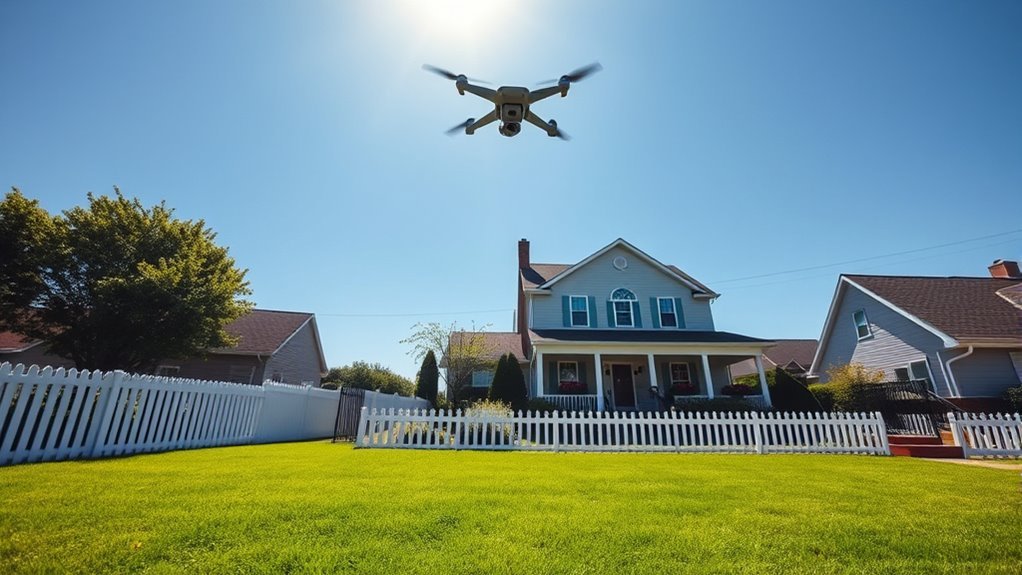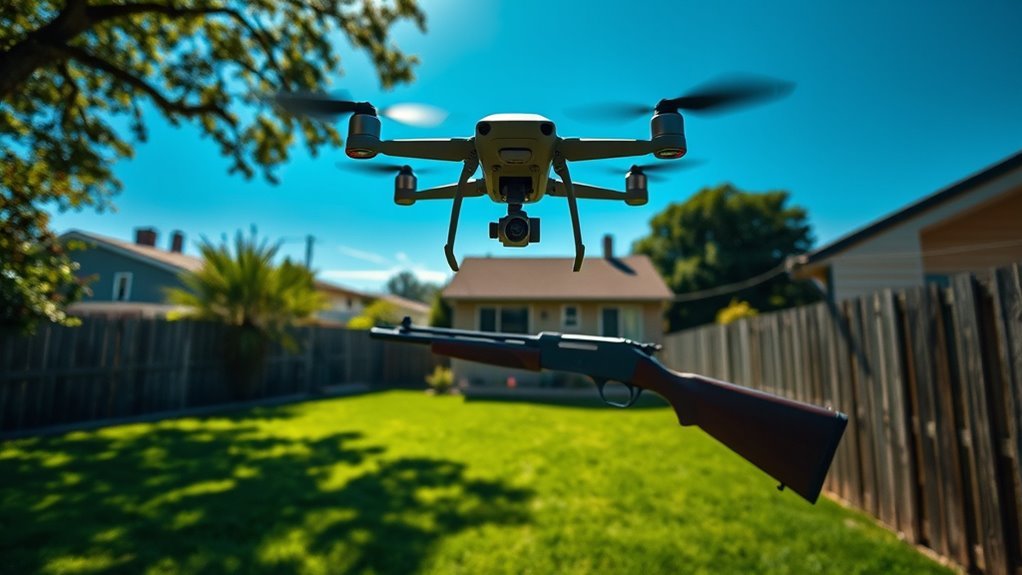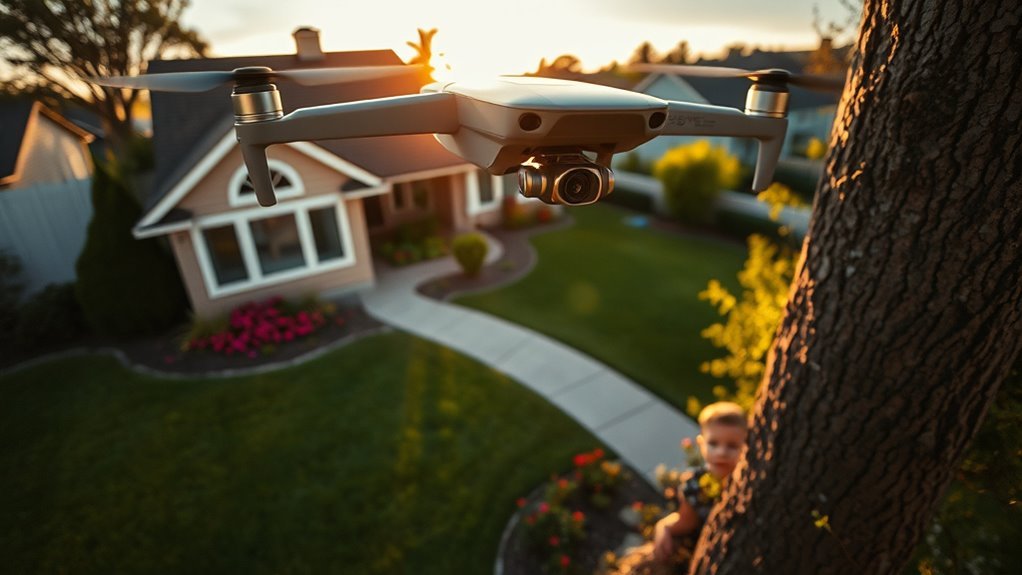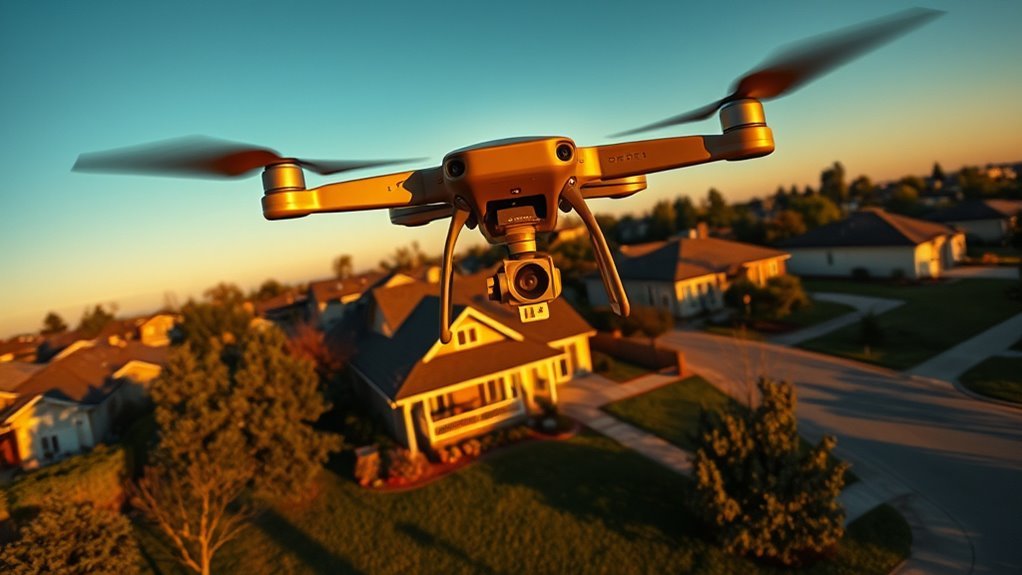You can’t legally shoot a drone flying over your house without facing serious criminal and civil penalties. The federal government controls the airspace above your property beyond immediate reaches, and destroying a drone may lead to charges for property damage or violating aviation laws. While protecting your privacy is important, taking violent action risks legal consequences. Instead, know your rights, explore safe alternatives, and understand how authorities can help address unwanted drone activity effectively.
Understanding Airspace Ownership and Drone Laws

Who really owns the airspace above your property, and how does that affect your ability to fly or shoot down a drone? Legally, airspace regulations grant you ownership only of the immediate reaches above your land, typically necessary for your use and enjoyment. The federal government, through agencies like the FAA, controls navigable airspace starting above that zone. Drone ownership doesn’t grant operators unrestricted rights to invade your airspace. However, your rights are limited; you can’t treat the air above your property as absolute private domain. Understanding this balance is vital for preserving your freedom while respecting federal oversight. Knowing where your property rights end and where drone operators’ rights begin helps you navigate conflicts without infringing on laws protecting airspace and drone use.
Legal Consequences of Shooting Down a Drone

Although it might be tempting to take matters into your own hands when a drone invades your privacy, shooting down a drone carries serious legal consequences. You must carefully consider the risks before acting. Here are three critical legal repercussions you face:
- Criminal charges – Destroying a drone can be viewed as damaging private property or violating federal aviation laws, leading to fines or even imprisonment.
- Civil liability – The drone owner may sue you for damages, including the cost of the drone and lost business or personal use.
- Federal enforcement – Agencies like the FAA strictly regulate airspace; shooting down a drone could trigger federal investigations and penalties.
Ultimately, protecting your freedom requires understanding these legal boundaries rather than resorting to destructive measures.
Privacy Rights Versus Drone Operations

How do your privacy rights balance against the increasing presence of drones in residential airspace? As drones become more common, drone privacy concerns intensify, especially regarding unauthorized aerial surveillance over your property. While you have a fundamental right to privacy in your home, the legal protections against drone incursions are still evolving. The challenge lies in distinguishing between lawful drone operations and invasive surveillance that infringes on your personal space. You can’t simply shoot down a drone; doing so may violate federal laws protecting aircraft. Instead, understanding the limits of drone use, local privacy statutes, and the scope of aerial surveillance is essential. Protecting your privacy means advocating for clearer regulations that respect your freedom without impeding lawful drone activities.
Safe and Legal Alternatives to Shooting a Drone
When faced with a drone intruding over your property, resorting to shooting it down isn’t just dangerous—it’s illegal under federal aviation laws. Instead, you can exercise your rights responsibly by exploring safe and legal alternatives that respect both your freedom and drone operators’ rights.
- Enhance Drone Control Awareness: Educate yourself about drone regulations and encourage operators to fly within legal boundaries, especially regarding aerial photography near private property.
- Use Physical Barriers: Install privacy screens or netting to obstruct unwanted aerial views without interfering with drone flight paths.
- Engage with Operators: Identify and communicate with drone pilots to resolve concerns amicably, fostering mutual respect and compliance.
These alternatives empower you to protect your privacy and property without violating laws or risking safety.
Reporting Unwanted Drone Activity to Authorities
If you encounter drone activity that crosses legal boundaries or poses a threat to your privacy and safety, you should report it to the appropriate authorities. Unwanted surveillance is not just an invasion of your personal space but a potential violation of your rights. To address this, familiarize yourself with the specific reporting procedures established by local law enforcement or aviation agencies. Provide clear, factual information—time, location, drone description, and any evidence like photos or videos. Avoid confrontations; instead, let authorities handle the situation within legal frameworks. Reporting unwanted drone activity is a vital step in protecting your freedom and privacy without resorting to unlawful measures. By following proper channels, you uphold the rule of law while defending your rights effectively and responsibly.

